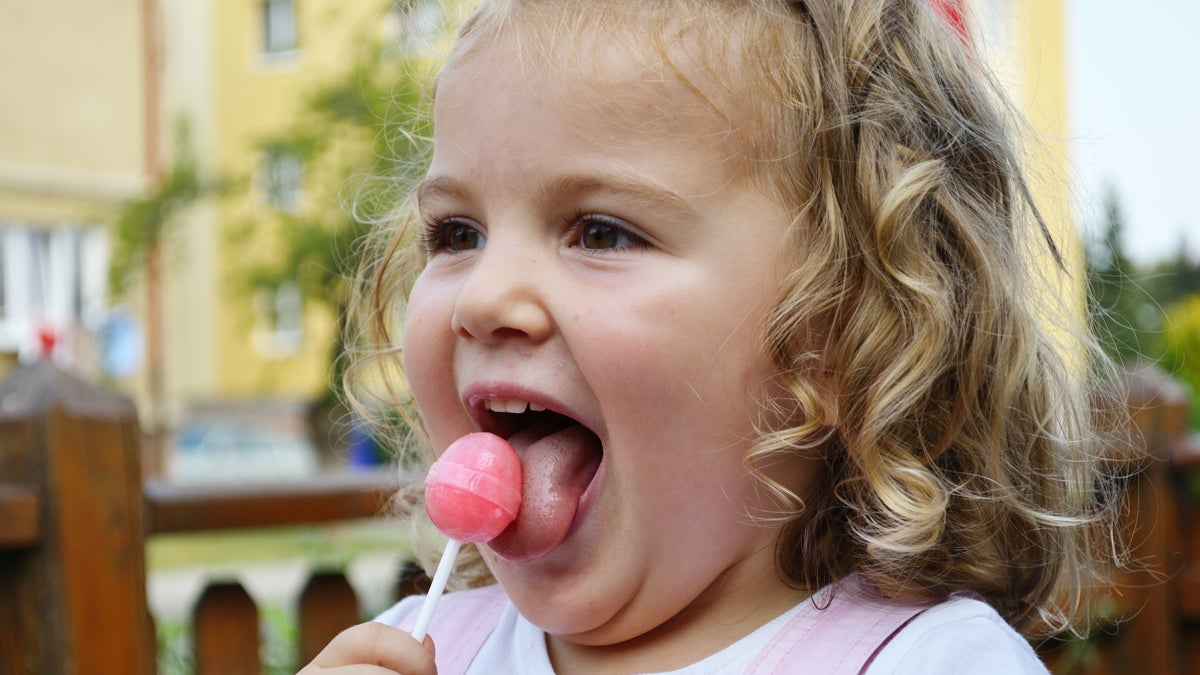Why some pediatricians are replacing lollipops with hugs and praise
Listen
(Shutterstock Image)
Can candy be good medicine at the doctor’s office?
When a child visits the pediatrician these days, she often comes home with a book, a sticker or maybe a temporary tattoo. Lots of doctors have stopped giving out lollipops.
Sabrina Statham says when it’s time for her three-year-old son Jayden’s booster shot, she holds him while someone from the doctor’s office distracts him.
If a child is particularly anxious, staffers at the Center for the Urban Child at St. Christopher’s Hospital for Children in North Philadelphia let patients blow bubbles to keep busy, or urge them to hold their breath and count to 10.
Jayden cries a little, but Statham said, “What? Like a couple seconds, it’s all good.”
The three year old left his check-up with a Ninja Turtle sticker.
“Our medical assistants have all been trained in special comfort measures like rubbing the muscle before they give the vaccine,” said center director pediatrician Katie McPeak.
Many hospitals and neonatal intensive care units use a few drops of sugar water to calm an infant who’s having a painful injection or circumcision. But for routine needle sticks at the pediatrician’s office, McPeak says there’s no need.
“A circumcision can take three to five minutes, our vaccines take seconds,” she said. “We like to reward kids with hugs, praise and ‘good job,’ not necessarily something that they are taking with them.”
Plus lollipops are a choking hazard.
“And Dum Dums are the worst because the head of the lollipop is so small it could actually fit into a child’s airway,” McPeak said.
(Of course, parents have to be alert with lots of foods–baby carrots can be a choking hazard too for children younger than age 4 or 5.)
McPeak said suckers also create a sticky mix of acid, bacteria and sugar in the mouth.
“When you are licking that lollipop, you’re presenting that sugar right to the child’s tooth, so giving a lollipop would be completely contradictory to our mission of preventing cavities,” she said.
Berkeley, California pediatrician Wolffe Nadoolman says he discourages parents from rewarding kids with candy.
And yet, at his practice there’s a basket filled with lollipops at the reception desk.
“I don’t do things always the way my peers do,” said Nadoolman, who’s written blogs as “The Empathic Pediatrician.”
The American Academy of Pediatrics doesn’t have an official policy on lollipops at the doctor’s office, but a spokeswoman said by email, “I think most practices now give large stickers or nothing at all.”
Nadoolman says a lollipop can have some clinical benefit and be a tool for good medicine—especially with very young children.
“Nobody likes getting shots,” he said. “There’s a shock-like reaction that happens physiologically in the child when they have such enormous anxiety. It’s not good enough to say to the child, ‘yes, but this will keep you healthy when you’re 15,’ they can’t project themselves that far in the future.”
Instead he asks preschoolers to think about what lollipop they’ll get after the needle stick. He says: pick a color, imagine the flavor.
Sugar isn’t a pain reliever, but we’re hardwired to love it, and Nadoolman says sugar can change brainchemistry almost as soon as it touches the tongue.
A child’s frame of mind can shift from ‘fight or flight’ to relaxed and happy, he said.
“Good-feeling receptors send a message to the brain that things are good, we are eating something yummy,” Nadoolman said.
After his vaccine, one boy in Nadoolman’s waiting room selected a root beer-flavored sucker, and said “I just like lollipops it really doesn’t fix anything.”
Nadoolman said there’s modest–if any–‘sugar rush’ from a 25-calorie lollipop. Though some parents worry about too many sweets, he says studies show that sugar doesn’t cause chronic hyperactivity or other behavior problems.
How he uses a lollipop depends on a child’s age and developmental stage. For example, older kids usually aren’t that anxious about getting their vaccines, but for them, a lollipop might make bitter medicine taste better.
For older school-age children who need help with focus, a lollipop can ‘punctuate’ the end of an office visit. Kids suddenly seem more willing to put their shoes back on, or put away the toys they’ve strewn across the waiting room.
Of course in the end, mom or dad has the final say.
“Some parents feel strongly that they don’t want the child to have it, and I respect that,” Nadoolman said.
WHYY is your source for fact-based, in-depth journalism and information. As a nonprofit organization, we rely on financial support from readers like you. Please give today.



